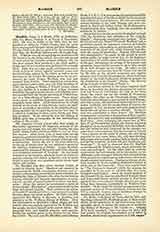

Macedo, FRANCISCO, known as A S. AUGUSTINO, O.F.M., theologian, b. at Coimbra, Portugal, 1596; he entered the Jesuit Order in 1610, which however he left in 1638 in order to join the Discalced Franciscans. These also he left in 1648, for the Observants. In Portugal he sided with the House of Braganza. Summoned to Rome by Alexander VII he taught theology at the College of the Propaganda, and afterwards church history at the Sapienza, and as consultor to the Inquisition. At Venice in 1667, during the week beginning September 26, he held a public disputation, against all comers, on nearly every branch of human knowledge, especially the Bible, theology, patrology, history, law, literature, and poetry. He named this disputation, in his quaint and extravagant style, “Leonis Marci rugitus litterarii” (the literary roaring of the Lion of St. Mark); this obtained for him the freedom of the city of Venice and the professorship of moral philosophy at the University of Padua. He died there May 1, 1681.
Rather restless, but a man of enormous erudition, he wrote a number of books, of which over 100 appeared in print, and about thirty are still unprinted. The following may be mentioned: “Collationes doe-trine S. Thomas et Scoti” (Padua, 16711 1673, 1680), 3 vols. in folio; “Scholm theologicie positivae ad confutationem haereticorum” (Rome, 1664) copied in part in Roccaberti, “Bibliotheca Maxima Pontificia”, XII (Rome, 1696) 221-48; “De clavibus Petri” (Rome, 1660) partially reprinted in Roccaberti, XII, 113-37; “Controversies selectee contra haereticos” (Rome, 1663).”Assertor romanus adversus calumnias heterodoxorum Anglorum priesertim et Scotorum in academiis Oxoniensi, Cantabrigiensi et Aberdoniensi” (Rome, 1667); “Tessera romana auctoritatis pontificiae adversus buccinam Thomas Angli” (London, 1654), also in Roccaberti, XII, 164-220. He also took an active part in the Jansenist controversy, being at first inclined to Jansenism; but afterwards he defended St. Augustine’s teaching with regard to Grace in the most decided manner.”Scrutinium divi Augustini” (London, 1644; Paris, 1648; Munster, 1649); “Cortina divi Augustine” (Paris, 1648 etc.); “Mena divi Augustini illustrate” (London, 1655); “Mens divinitus inspirata SS. papas Irmocentii X.” (Louvain, 1655); “Commentationes dues ecclesiastico-polemicae” (Verona, 1674), concerning Vincent of Lerins and Hilarius of Arles, against whom H. Norisius wrote his “Adventoria” in P.L., XLVII, 538 sq.”Medulla histories ecclesiasticae” (Padua, 1671); “Azymus Eucharisticus”, Ingolstadt (Venice,), 1673, against Cardinal Giovanni Bona, and at once placed on the Index (June 21, 1673), “until it is corrected”, which was done in the new edition (Verona, 1673). Mabillon also wrote against this.”Schema S. congregationis s. officii” (Padua, 1676).
MICHAEL BIHL

